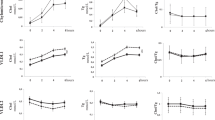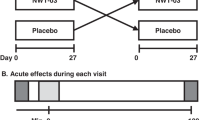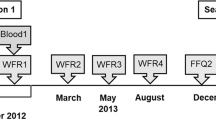Abstract
Objective: To examine the effects of the inclusion of extruded dry beans in the diet on serum lipoprotein, plasma fibrinogen, plasma viscosity and plasminogen activator inhibitor 1 (PAI-1) levels.
Subjects and study design: Twenty-two free living hyperlipidaemic men participated in this randomised, controlled, cross-over study. The subjects were randomly assigned to one of two groups. After a run-in period of four weeks, during which subjects followed their normal diet with the exclusion of dry beans, group A had to include 110 g/day of extruded dry beans in the form of baked products for four weeks while group B continued with the run-in diet. A washout period of four weeks followed after which the experimental intervention was crossed-over. Anthropometric measurements, serum lipoproteins and haemostatic variables were measured with standard methods and dietary intakes were estimated with five-day dietary records at the beginning and end of each experimental period.
Results: Compliance was determined as 83.5% with a mean intake of 91.9 g/day extruded dry beans. Extruded dry beans did not have significant effects on total serum cholesterol, low density lipoprotein cholesterol, triglycerides, apolipoprotein A or B, plasma fibrinogen and plasma viscosity concentrations. High density lipoprotein cholesterol concentrations decreased in both the dry bean and control periods. Lipoprotein (a) concentrations increased with intake of extruded dry beans, but this increase was probably not due to an independent effect of extruded dry beans. Plasminogen activator inhibitor 1 levels were significantly lower after the intake of extruded dry beans compared to the control period.
Conclusions: The inclusion of 91.9 g extruded dry beans per day in the diet had no effects on serum lipoproteins, plasma fibrinogen and viscosity levels but decreased PAI-1 levels.
Sponsorship: Dry Bean Producers Organisation (South Africa) and the Potchefstroom University for Christian Higher Education, Potchefstroom, South Africa.
European Journal of Clinical Nutrition (2000) 54, 373–379
This is a preview of subscription content, access via your institution
Access options
Subscribe to this journal
Receive 12 print issues and online access
$259.00 per year
only $21.58 per issue
Buy this article
- Purchase on Springer Link
- Instant access to full article PDF
Prices may be subject to local taxes which are calculated during checkout
Similar content being viewed by others
Author information
Authors and Affiliations
Contributions
Guarantor: Dr W Oosthuizen.
Contributors: WO was involved in all aspects of the study, and was co-ordinator of the study and main author of the paper; CSS was involved in all aspects of the study and contributed to the writing of the paper; HHV contributed to the study design and critically revised the paper; JCJ contributed to the study design, laboratory analysis and critically revised the paper; WJHV was responsible for lipoprotein analysis.
Corresponding author
Rights and permissions
About this article
Cite this article
Oosthuizen, W., Scholtz, C., Vorster, H. et al. Extruded dry beans and serum lipoprotein and plasma haemostatic factors in hyperlipidaemic men. Eur J Clin Nutr 54, 373–379 (2000). https://doi.org/10.1038/sj.ejcn.1600966
Received:
Revised:
Accepted:
Published:
Issue Date:
DOI: https://doi.org/10.1038/sj.ejcn.1600966
Keywords
This article is cited by
-
A High Legume Low Glycemic Index Diet Improves Serum Lipid Profiles in Men
Lipids (2010)
-
Effects of pulse consumption in women presenting components of the metabolic syndrome: a randomized controlled trial
Mediterranean Journal of Nutrition and Metabolism (2010)



